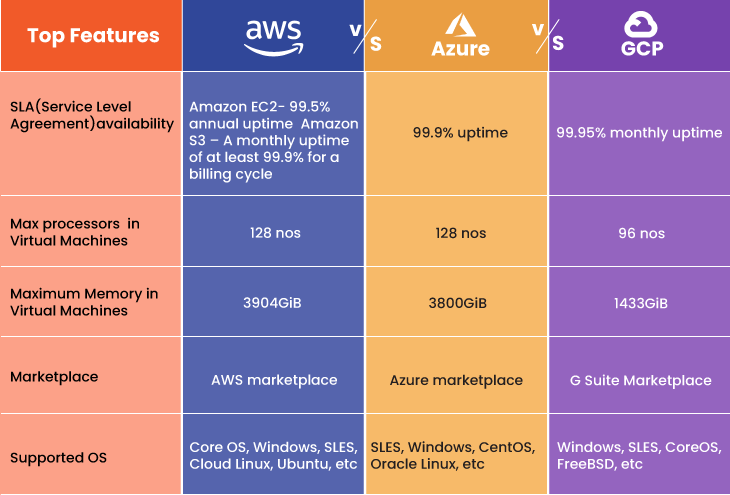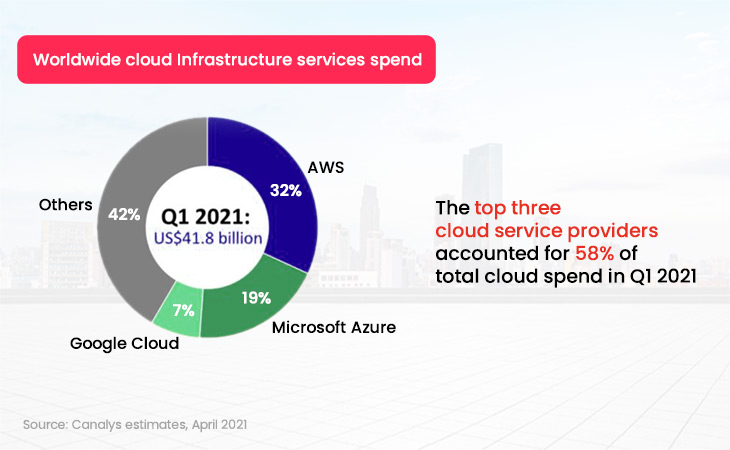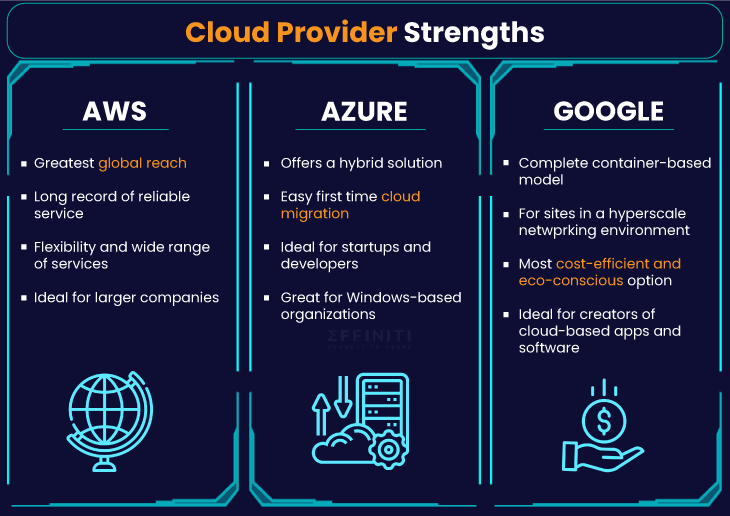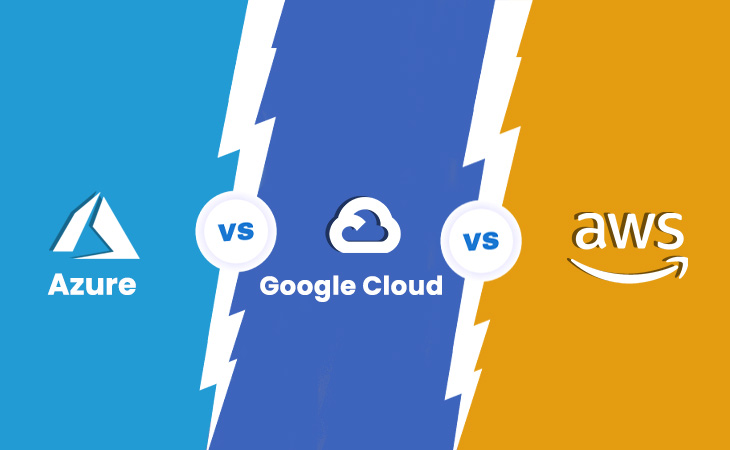Cloud technology has propelled the digital transformation of the world. With the need to innovate and optimize business operations, most entrepreneurs are jumping onto the bandwagon of the cloud. Since it was introduced to the world in 2006, the cloud has come a long way.
The cloud market is dominated by three players: Amazon Web Services (AWS), Microsoft Azure, and Google Cloud (GCP).
These world’s biggest cloud providers offer a slew of features that entice clients but sometimes confuse them. It is pertinent to understand what features each cloud tech showers upon their clients before embarking on the cloud journey. Without further ado, let’s pit the cloud giants against each other.
Azure Vs GCP Vs AWS – The Cloud Platform of Your Choice?
1) Pro and Cons of Azure
Azure is Microsoft’s cloud technology which is experiencing incredible global growth. Introduced in 2010, Azure is famous for its industry-specific offerings. With its billion-dollar market, Azure is a formidable force in the cloud arena.
| Pros | Cons |
| Global presence | Requires platform expertise |
| Industry-specific offerings | Complex pricing models |
| Hybrid Infrastructure | Data transfer hindrances |
| Security | – |
True to its spirit, Azure is omnipresent, just as the clouds in the sky are. The Microsoft cloud has more global regions than any other cloud provider. Azure possesses an edge over the others with its formidable geographical presence and firm adherence to local laws. But, there is a steep learning curve, despite Azure’s compatibility.
It is wise to employ an Azure services provider such as Effiniti to maintain and manage the cloud solutions.
Microsoft has watered down the learning challenges by providing industry-specific offerings. The organization is providing customized Azure solutions to clients of various industrial sectors ranging from finance to non-profit. Notwithstanding this, Azure doles out new features once every three weeks. However, navigating through the myriad Azure pricing models is an arduous task. One ought to deliberate before picking the best pricing model.
Although other cloud providers don’t actively support hybrid integration, Azure offers this distinctive feature. Sporting this edge over its competition, Azure is much more welcoming of its clients. The downside is that one ought to watch out for the lurking data transference fees. Due to multiple integrations and infrastructures, it is wise to be eagle-eyed for any unforeseen costs.
One of the biggest pros of using Azure is the security it offers. The cloud is fortified with Software Development Lifecycle (SDL), a class above the others. Azure also offers to encrypt existing and new accounts.
With pros outweighing the cons, Azure has become an integral part of most companies worldwide.
2) Pros and cons of AWS:
Amazon Web Services or AWS is the oldest cloud tech in this trio. Introduced in 2006, the online retailer developed this scalable technology to mitigate the fluctuating demands and never-constant expenses.
The cloud tech gained popularity for its Infrastructure as a Service (IaaS) offering. Embodying the age-old saying ‘the early bird gets the worm’, the oldest tech solution is now the most prominent player in the cloud market.
| Pros | Cons |
| Ease of use | Steep learning curve |
| Variety of options | The overwhelming variety of features |
| Scalability | Lack of appropriate support for hybrid solutions |
| Reliablity | Technical support fee |
It has been observed that AWS is easy to use, even for novices. This makes AWS a better option for beginners who are seeking to migrate to the cloud. However, there is a steep learning curve for software-defined data centers, which even large enterprises often struggle with. Despite initial hiccups, AWS is relatively easier to use.
Buttressing the ease of use is the plethora of tools AWS offers. From CloudFormation tool, which allows clients to model their infrastructure from a single text file, to Trusted Advisor, which recalibrates your model to optimal performance. The latter reduces unwanted expenses by axing redundant processes. Although AWS is quite transparent with its offerings, the variety can be mind-boggling.
Going through each selection and researching every available tool is a tedious task by itself. Employing a reputable consultant to steer you through the vast array of selections would be a wise decision.
Like Azure, AWS features auto-scalability, which appeases the clients by automatically calibrating the cloud as per the demand. Apart from autoscaling, clients can experience terrific response speed from AWS whenever they needed to upscale the servers.
The positive satisfaction created by this speed is one of the significant factors propelling AWS adoption. However, AWS has been observed to have adopted a monolithic stance by not providing enough support for hybrid solutions, among other aspects. This is one limitation of AWS which Azure has capitalized upon.
Adding tailwinds to the AWS adoption is the robust nature of the tech. The cloud has been commended for its reliable nature and rare letups. It is also famous for its speedy tech support team. However, one has to pay the technical support fee to get the best and immediate response from the support. This is another expense that the users will have to bear for the best AWS experience.
3) Pros and Cons of Google Cloud
The latest entrant in the trio is Google Cloud Platform (GCP). Although it has arrived late on the scene, the tech is the third biggest constituent of the cloud market. With its presence in 21 regions, GCP is compatible with operating systems ranging from Linux to Windows.
Google exploited its experience in laying undersea cables to expand GCP at a breakneck speed. Despite lagging behind AWS and Azure, GCP has garnered enough traction across the globe.
| Pros | Cons |
| Data storage | File management |
| App deployment | Dearth of support for third party application integration |
| AI and analytics | Monthly fees |
| Productivity tools | UX needs improvement |
GCP offers massive data storage to its clients. The multi-region storage eases things immensely for its clients. However, multi-region storage causes a minor delay in information transmission. Though the storage of GCP is perceived to be reliable, the clients do have their qualms. Managing files that involve both pasting and retrieving impedes GCP performance.
With clients deploying thousands of apps and solutions on the cloud, reliability does come into question. GCP handles the burgeoning load effortlessly. It makes use of its autoscale feature for a better experience. Bogging this advantage down is the relative absence of support for third-party application integration. Although the GCP is compatible with various operating systems, it runs aground on this aspect.
Despite its ample storage over different regions, GCP gleans off information after multiple analyses. The cloud employs AI and machine learning to give its clients vital statistics. However, all this comes at a price. Though GCP features the pay-as-you-go model, which bills you for every used second, there is a general discontent that the cloud tech of Google is a costly solution.
GCP provides various tools and infrastructure to support productivity, as a cloud is expected to. Hindering the complete exploitation of this toolset is the UX and UI, which need further refinement.
Money matters: Price comparison of AWS vs. Azure vs. GCP
Competitive pricing is an absolute must to stay in the game. All the three contenders sport pay as you go model. While AWS bills its clients hourly, Azure bills its users on a minutely basis. GCP took it further by implementing the billing process on a seconds basis.
What’s more, they all offer free tire of service where the customers can explore a limited variety of cloud services. However, a common qualm about cloud billing is that they are pretty complex, and hidden costs lurk around in the cloud.
Most users hire experienced third-party organizations to help them understand and mitigate cloud expenses. Although every business has its own unique needs, tabulated below is the smallest to biggest cloud expenses.
| Machine Type | AWS | Azure | GCP |
| Smallest Instance | 2 virtual CPUs and 8 GB of RAM will cost nearly USD69 per month | Instance with 2 vCPUs and 8 GB of RAM, in Azure, costing USD70/month | 2 virtual CPUs and 8 GB of RAM at a 25 percent cheaper rate costing USD52/month |
| Largest Instance | 3.84 TB of RAM and 128 vCPUs will cost around USD3.97/hour | 3.89 TB of RAM and 128 vCPUs. It costs around USD6.79/hour | 3.75 TB of RAM and 160 vCPUs. It will cost close to USD5.32/hour |
Availability of the three techs:
The three cloud solutions have positioned their servers in strategic geographical locations, called availability regions. Having this choice allows the clients to choose their servers as per their business requirements.
Based on the latency, the law of the land, the clients can further refine their selection. All three cloud giants have established their global presence with their servers. However, Google is lagging behind the two, relatively. But, with its swift cabling and efforts, GCP is catching up on this front.
AWS is available in 25 geographical regions and 80 availability zones. Having provided its services to 245 countries, AWS has established its monolithic presence in the cloud. Its users can partition apps across multiple availability zones in the same region. One can also change the region and zone, thanks to the convenience that AWS brings along. Clients can also choose whether to run their applications on the on-premises with AWS outpost, which strong-arms the clients with on-premises AWS infrastructure.
Azure has leveraged Microsoft’s global presence to establish its presence in the world. It has increased to 44 regions, two of which are in the African continent. Azure’s presence is 2x more than AWS and GCP, individually. With its reach in every continent, Azure has an unparalleled global presence. The cloud is also popular among its clientele for its hybrid infrastructure integration, which is relatively better than AWS and GCP.
GCP has pitched its tent in 25 regions and 76 zones. Available in more than 200 countries, GCP is continuing to expand its server locations. Despite its relatively low footprint, GCP has positioned itself as the third biggest constituent in the cloud market.
To sum it up, AWS has the most reliable storage, while Azure has the most expansive reach, and Google has the fastest emerging network.
Azure vs AWS vs Google Cloud: Feature-wise comparison
The three giants offer an oceanic variety of features for customers. Azure goes a step further and brings out new features once every three weeks. Catering to the ever-expanding clientele, cloud providers are expanding their storage rapidly.
With pay-as -you-go model, clients only have to pay for the storage they use in terms of gigabytes and the monthly fee for accessing it. One of the unifying aspects of all three providers is that they provide cost-effective hardware, but their operating costs are higher.

Considering the swath of features that usually require multiple sign-ons, all three providers have doubled down on identity access management. AWS manages the identity services quite differently than the other two contenders. The identity profiles on AWS can also be used for only one particular organization.
Azure, on the other hand, sources identities from its plethora of products. This includes roping in identity profiles from Office 365 suite.
Azure allows the users to be footloose by allowing users to switch between multiple directories without logging in each time to access its various features. GCP took a step further by sourcing identities even from its Google consumer accounts.
The user can access multiple projects and features with a single account, making the credentials management relatively easy for the cloud and the user. Encapsulated below is a market share comparison of the three cloud giants.
Market share: AWS>Azure>GCP

AWS, the earliest entrant, occupies the most significant cloud market share. With over 170 services, AWS’s 33% market share is massive enough to dwarf Azure and GCP, as per the analysis of Synergy Research Group. The biggest cloud tech will continue to expand its hybrid cloud strategy in 2021. This will only propel AWS’s growth further.
On the second rung is Azure, with an 18% market share. The Microsoft cloud has grown massively in size and has reaped profits. Azure is doing anything but slowing down. The cloud’s widespread availability and its robust hybrid infrastructure are attracting more clients with every passing quarter. It is worth mentioning that Amazon’s competitors are Azure’s clients as they don’t like to employ AWS, which Amazon owns.
GCP has a lot of ground to cover as it occupies only 9% market share. Although it relatively doesn’t offer many more features and tools than AWS and Azure, GCP has created its niche in the market. Its strengths lie in the Kubernetes optimization and simpler pricing model. The latter aspect is an area where AWS and Azure need to improve upon as most clients have to employ third-party resources to avoid overspending and hidden costs.
Conclusion: Which one to choose – AWS vs Azure vs GCP?

AWS, Azure, and GCP. Three cloud solutions with a tonne of potential waiting to be harnessed by their clients. However, choosing the right cloud is an arduous task by itself. Each cloud has its own unique set of advantages, which are not always optimal for all.
One ought to realize that choosing the right cloud is the key to a smooth business run. It is pertinent to comprehend that a cloud solution that suits others may not suit you. One must understand the needs, mull over expectations and budget before picking the cloud.
After due deliberation, it is wise on your part to employ a third-party resource to advise you. As this is business, it is better not to test your luck and take leaps of faith. Not everyone lands on their feet. Employing a cloud solutions provider reduces liabilities, expenses, snafus, and potential threats.
An experienced third-party resource, such as Effiniti, will guide you from migration to disaster recovery.
Effiniti, a formidable figure in the cloud consultancy arena, helps its clients sail smoothly on the waters of Azure. Based out in Texas, Effiniti is an Azure services and solutions provider which helps its clients realize their goals. We provide services to enterprises that are keen to migrate and operate on Azure.
From strategizing to DevOps services, we dot all the Is’ and cross all the Ts’ when it comes to Azure. We have deftly guided Fortune 500 on their Azure journey and continue to tailor solutions to aspiring Azure voyagers. With your ideas and our efforts, let’s create an optimal Azure fit just for you.
More Articles:

